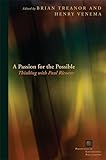A Passion for the Possible : Thinking with Paul Ricoeur / ed. by Henry Isaac Venema, Brian Treanor.
Material type: TextSeries: Perspectives in Continental PhilosophyPublisher: New York, NY : Fordham University Press, [2022]Copyright date: ©2010Description: 1 online resource (248 p.)Content type:
TextSeries: Perspectives in Continental PhilosophyPublisher: New York, NY : Fordham University Press, [2022]Copyright date: ©2010Description: 1 online resource (248 p.)Content type: - 9780823232932
- 9780823290789
- online - DeGruyter
| Item type | Current library | Call number | URL | Status | Notes | Barcode | |
|---|---|---|---|---|---|---|---|
 eBook
eBook
|
Biblioteca "Angelicum" Pont. Univ. S.Tommaso d'Aquino Nuvola online | online - DeGruyter (Browse shelf(Opens below)) | Online access | Not for loan (Accesso limitato) | Accesso per gli utenti autorizzati / Access for authorized users | (dgr)9780823290789 |
Frontmatter -- Contents -- Acknowledgments -- Introduction: How Much More Than the Possible? -- Asserting Personal Capacities and Pleading for Mutual Recognition -- Religious Belief: The Difficult Path of the Religious -- Remembering Paul Ricoeur -- Capable Man, Capable God -- The Source of Ricoeur’s Double Allegiance -- The Golden Rule and Forgiveness -- Toward Which Recognition? -- Paul Ricoeur and Development Ethics -- Narrative Matters among the Mlabri Interpretive Anthropology in International Development -- The Place of Remembrance: Reflections on Paul Ricoeur’s Theory of Collective Memory -- Refiguring Virtue -- Emplotting Virtue: Narrative and the Good Life -- Preserving the Eidetic Moment: Reflections on the Work of Paul Ricoeur -- Notes -- Contributors -- Index of Names
restricted access online access with authorization star
http://purl.org/coar/access_right/c_16ec
Paul Ricoeur's entire philosophical project narrates a "passion for the possible" expressed in the hope that in spite of death, closure, and sedimentation, life is opened by superabundance, by how the world gives us much more than is possible. Ricoeur's philosophical anthropology is a phenomenology of human capacity, which gives onto the groundless ground of human being, namely, God. Thus the story of the capable man, beginning with original goodness held captive by a servile will and ending with the possibility of liberation and regeneration of the heart, underpins his passion for the more than possible. The essays in this volume trace the fluid movement between phenomenological and religious descriptions of the capable self that emerges across Ricoeur's oeuvre and establish points of connection for future developments that might draw inspiration from this body of thought.
Mode of access: Internet via World Wide Web.
In English.
Description based on online resource; title from PDF title page (publisher's Web site, viewed 03. Jan 2023)


